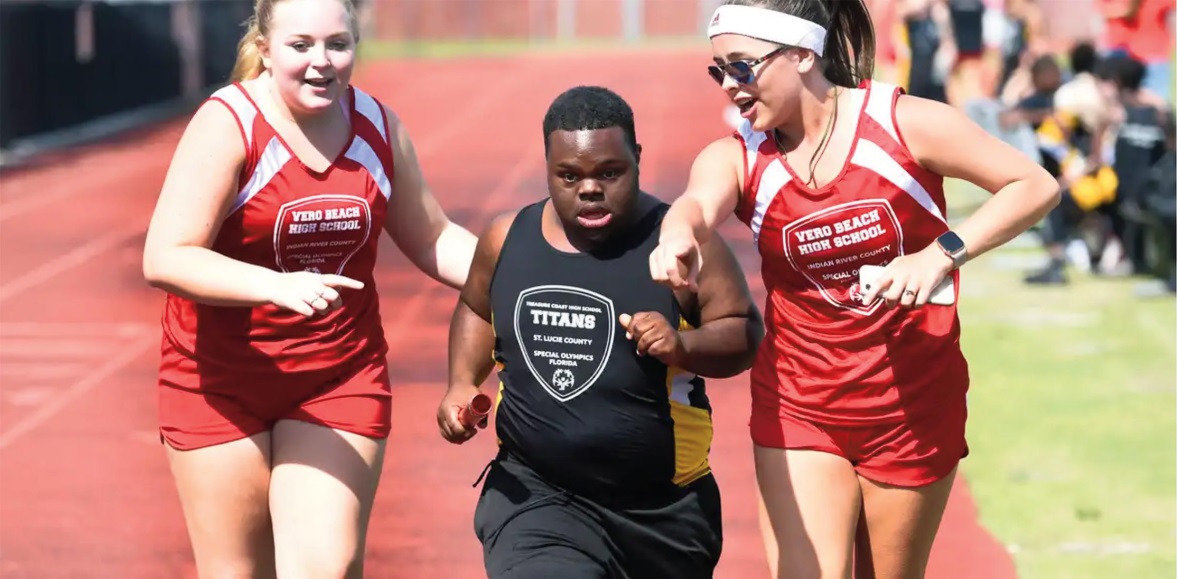
DIGGING DEEP: Vero Beach. High School senior and Special Olympics Unified Sports athlete Corey Davis gets extra encouragement student volunteers at a Special Olympics Unified Sports track meet at the Citrus Bowl.
ADAPTIVE EQUIPMENT FACILITATES "ACCESS AND INCLUSION"
Adaptive recreation can only be accomplished with the use of adaptive equipment, which can be very expensive. The reality is most insurance companies do not cover the cost of adaptive sports equipment. This is an unfortunate barrier which results in individuals living with physical challenges not having access to the critical adaptive sports and programming needed to be active. Adaptive equipment offers many additional benefits for individuals with disabilities as they can be a replacement for the skills a person lacks, and can reduce daily frustrations, allow accessibility, and empower and encourage participation creating inclusive opportunities within the community for people to participate with their non-disabled peers. There are organizations that offer grants3 for individuals to apply for Adaptive Sports Equipment, Automotive, and Home Needs
BENEFITS OF ADAPTIVE SPORTS AND RECREATION
According to the Centers for Disease Control and Prevention (CDC), 61 million adults in the United States live with a disability which means 26 percent (one in 4) of adults in the United States have some type of disability. The CDC data further shows that one in two people with disabilities are physically inactive3 which makes them more likely to have comorbid conditions such as high blood pressure and depression, and can also lead to social isolation and decreased quality of life. Adaptive sports and recreation provide the opportunities for individuals living with disability to be physically active and also help:
- Improve overall health, increase life satisfaction, decrease depressive symptoms, and develop a positive self and athletic identity in individuals.
- The universal popularity of sports serves as an ideal tool for fostering the inclusion and well-being of persons with disabilities.
- Sports help reduce stigma and discrimination associated with disability as it transforms community attitudes about per
sons with disabilities by highlighting their skills and reducing the tendency to see the disability instead of the person.
- Through sport, persons without disabilities interact with persons with disabilities in a positive context forcing them to reshape assumptions about what persons with disabilities can and cannot do.
- Sports help individuals with disabilities acquire vital social skills, develop independence, and become empowered to act as agents of change.
- Studies have shown that playing an additional year of adaptive sport is associated with an increase in likelihood of employment.4 •
References
- Adaptive Sports physio-pedia.com/Adaptive_Sport
- U.S. States Embracing Unified Sports specialolympics.org/what-we-do/sports/unified-sports
- Grants for Adaptive Sports Equipment, Automotive, and Home Needs sralab.org/lifecen- ter/resources/listing-grants-adaptive-sports-equipment-automotive-and-home-needs
- Research on Adaptive Sports and Recreation moveunitedsport.org/wp-content/uploads/2021/06/The-Influence-of-Adaptive-Sports-on- Self-Efficacy-Quinnipiac-University-LOF-Adaptive-Skiers.pdf
- Playing Adaptive Sports Linked to Higher Employment, Economic Impact uh.edu/news- events/stories/2015/August/827DisabilityEmployment.php
ABOUT THE AUTHOR:

Garima Jain, N.D., C.N.C., CHW is Family Support Specialist, on NJ Integrated Care for Kids (InCK). Hackensack Meridian Health, in partnership with Visiting Nurse Association Health Group, the New Jersey Health Care Quality Institute, New Jersey Chapter of the American Academy of Pediatrics (NJAAP), Central Jersey Family Health Consortium and SPAN Parent Advocacy Network has entered into a collaborative agreement with Centers for Medicare and Medicaid Services (CMS) to establish the NJ Integrated Care for Kids (InCK) model which is a family-centered model aimed at providing coordinated care for children and youth on NJ Family Care families. Garima has been involved for over a decade with various education, advocacy and healthcare projects at SPAN Parent Advocacy Network (spanadvocacy.org)